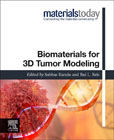
2D cell culture models are utilized in order to develop an understanding of cancer and to develop potential treatments. However there are many limitations to 2D models, mainly that they do not correctly capture the full picture of a 3D biological system, its architecture and microenvironments. 3D culture models have the potential to provide more accurate pictures of these systems and replicate the complexity and hierarchical organization of natural ECM of tumor cells. Biomaterials for 3D Tumor Modeling reviews the fundamentals and most relevant areas of the latest advances of research of 3D cancer models, focusing on biomaterials science, tissue engineering, drug delivery and screening aspects. The book reviews advanced fundamental topics including causes of cancer, existing cancer models, angiogenesis and inflammation during cancer progression, and metastasis in 3D biomaterials. Then, the most relevant biomaterials are reviewed including methods for engineering and fabrication of biomaterials. 3D models for key biological systems and types of cancer are discussed including lung, liver, oral, prostate, pancreatic, ovarian, bone and paediatric cancer. Biomaterials for 3D Tumor Modeling is suitable for those working in the disciplines of materials science, biochemistry, genetics, molecular biology, drug delivery, and regenerative medicine. Reviews key biomaterials topics including synthetic biomaterials, hydrogels, e-spun materials, nanoparticles, including materials design and processing conceptsProvides comprehensive overview of 3D cancer models for key biological systems and cancer typesIncludes overview of advanced fundamental concepts for an interdisciplinary audience in materials science, biochemistry, regenerative medicine and drug delivery INDICE: 1. Introduction: Biomaterials for 3D cancer cell culture models2. Causes of cancers: physical, chemical, biological carcinogens and viruses3. Existing in vitro and in vivo cancer models4. Angiogenesis during tumor progression5. Inflammation and cancer progression6. Metastasis in 3D biomaterials7. 3D tumor organoids8. Engineering 3D hydrogels for personalized in vitro human tissue models9. 3D culture system of solid tumors and cancer metabolism10. 3D matrices and surface architecture for cancer research11. 3D (bio) printing of tumor models12. E-spun 3D materials for cancer modelling13. 3D scaffold materials for skin cancer14. 3D models and efficacy of drugs and chemicals15. Synthetic biomaterials 3D cancer model16. Silica nanoparticles as theranostics cancer treatment17. In silico 3D cancer modelling18. Cancer immunotherapy19. 3D lung cancer tissue model20. 3D liver cancer disease model21. 3D oral cancer model for tackling drug resistance22. In vitro 3D modelling for prostate cancer 23. Pancreatic cancer organoids24. Pediatric 3D cancer model25. In vitro 3D ovarian cancer therapy26. Bio-glass and 3D bone cancer model27. Nanoparticles as cancer therapeutic carriers28. Tumor angiogenesis using 3D biomaterials29. Industrial applications of tumor-on-a-chip30. Microfluidic systems in cancer research31. Biomaterial based anticancer drug delivery32. Bio-detection/biosensor and diagnostics for cancer diseases33. Living cancer cell imaging34. 3D preclinical cancer models
- ISBN: 978-0-12-818128-7
- Editorial: Elsevier
- Encuadernacion: Rústica
- Páginas: 700
- Fecha Publicación: 01/08/2020
- Nº Volúmenes: 1
- Idioma: Inglés
